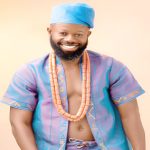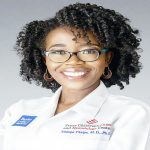George Chigozie Njoku is a Nigerian PhD student specialising in cellular physiology and molecular medicine at the University of Nebraska Medical Center, United States. He is driven to translate cutting-edge science into real treatments that protect brain health and transform futures. In this interview by Kingsley Alumona, he speaks about his studies and work in the US.
Your academic journey progressed from a BSc in biochemistry (Michael Okpara University of Agriculture, Umudike, Abia State, Nigeria) to an MSc in Biohealth-engineering (Université Grenoble Alpes, France) to a PhD in view in cellular physiology/molecular medicine (University of Nebraska Medical Center, United States). How do you manage these three seemingly distinct areas of specialisation in your research and work?
Although my academic journey may seem like a progression through distinct areas, they are deeply interconnected and have built upon one another in a meaningful way. My background in biochemistry helps me understand the molecular mechanisms at play, while my training in bio-health engineering equips me with the analytical and translational skills to design meaningful experiments. Everything comes together in my current work, where I apply cellular physiology and molecular techniques to address pressing and complex biomedical challenges. So, rather than seeing them as separate areas, I see my academic path as a continuum, where each stage has provided essential tools that I now integrate to ask more complex and relevant questions in biomedical research.
Your current area of study seems like a typical clinical student’s/doctor’s study. How does your current work or study differ from what clinical researchers or doctors do?
While my research touches on clinical issues, like HIV-associated neurocognitive disorder, it is fundamentally different from what a medical doctor or a clinical researcher typically does. My work is grounded in basic and translational science. I focus on understanding the cellular and molecular mechanisms behind disease.
Medical doctors are trained to diagnose and treat patients based on current clinical knowledge. Clinical researchers often conduct trials to evaluate how effective or safe a treatment is in humans. While I deeply respect what clinicians do, I do not see myself practising medicine. I see myself continuing in biomedical research, using my training to bridge gaps between molecular insights and real-world therapies, especially in the areas of neuroinflammation and virus-associated brain disorders.
For your master’s degree work, you worked on two cellular vascular diseases. Which diseases were they, how did you leverage biohealth engineering to study them, and what significant things could we learn from them?
During my master’s at Steno Diabetes Center Copenhagen, Denmark, I worked on two projects focused on immune-mediated diseases, which were Type 1 diabetes and inflammatory bowel disease (IBD). The first project explored how extracellular vesicles (EVs) could act as messengers that either trigger or calm inflammation. We used high-throughput tools to isolate and study these EVs from mesenchymal stem cells, showing their potential as a cell-based therapy.
The second project looked at conserved RNA structures in IBD to identify possible targets for treatment. Here, we used computational tools and experimental validation to study whether certain RNA structures are conserved across patients and might play a role in how the disease behaves.
Both projects taught me the value of combining biology, engineering, and data analysis to understand and treat complex diseases.
Tell us about your PhD work/thesis and the likely findings from it.
I am currently in the early phase of my PhD, where I am exploring how HIV affects microglial function in the brain. Studies have shown that people living with HIV are up to 50 per cent more likely to develop neurocognitive issues, and there is growing evidence linking HIV to Alzheimer’s-like brain changes, including amyloid accumulation and chronic inflammation. So, my research aims to understand whether HIV interferes with microglia’s ability to clear amyloid beta, and if this might explain some of the memory loss or cognitive decline seen in HIV-positive individuals.
While I do not have solid data yet, I am laying the groundwork with cell-based models and plan to share findings as they develop. Ultimately, this work could help identify new targets for preventing or treating HIV-associated neurocognitive disorders.
What is the latest research in cellular physiology and molecular medicine, and how can such innovative research help people suffering from diseases associated with such areas of medicine?
One of the latest areas of research in cellular physiology and molecular medicine is the use of CRISPR gene-editing tools to correct faulty genes and study how cellular stress pathways or dysfunctional organelles like mitochondria drive disease progression. Innovative research like this helps us better understand what is going wrong at the cellular level, which makes it possible to design more targeted and effective treatments.
Instead of just managing symptoms, we are now moving toward therapies that correct the root cause of disease, whether that is reprogramming immune cells, targeting specific proteins involved in disease, or using nanoparticles to deliver drugs exactly where they are needed.
Most health and medical researchers focus on finding the cure to diseases, with little or no attention to how to naturally prevent them. Why emphasise cure rather than prevention?
To me, prevention is better than a cure, but most research focuses on cures because people usually seek help after they are already sick. Also, some diseases do not have clear causes we can easily prevent, like cancer or Alzheimer’s. Still, many cure-focused studies help with prevention too, by revealing risk factors, leading to vaccines, or guiding lifestyle changes. In the end, both prevention and cure are important and often work together.
Some medical experts believe that intermittent fasting, like eating minimal food once or twice a day, could naturally boost the immune system and even cure some diseases. As someone who researches how the immune system works, what is your take on this?
Yes, there is some science behind intermittent fasting. When we fast, the body goes into a kind of repair mode where it clears out damaged cells, reduces inflammation, and improves how our immune system works. Studies have shown that it can help with things like insulin sensitivity, reducing the risk of chronic diseases, and even slowing ageing. But we must know that it is not a one-size-fits-all. While fasting might help some people, it could be harmful to others, especially those with certain medical conditions.
You have studied at a Nigerian university and two foreign universities. What would you recommend that would improve medical research and innovations in Nigerian universities?
Studying in Nigeria and abroad has helped me see both the strengths and challenges in our research systems. Nigerian universities are full of brilliant minds, but limited funding, outdated equipment, and a lack of research-focused policies often slow progress. To improve medical research and innovation, we need sustained investment in research infrastructure, stronger industry-academic partnerships, and training that emphasises critical thinking and hands-on experience. Also, encouraging collaborative research, both locally and internationally, and focusing on diseases that affect our population, like malaria, can lead to innovations that truly make a difference.
With the right support, Nigeria has the talent and potential to become a hub for groundbreaking medical discoveries.
In recent times, the rate of disease and the medications to manage them have increased in Nigeria. What is your advice to Nigerians on how best to naturally ensure stronger immune systems and healthy living?
Prevention starts with how we live. To naturally boost the immune system, Nigerians should focus on eating more balanced, local foods, like fruits, vegetables, whole grains, and less processed meals. Regular exercise, clean water, enough sleep, and managing stress also play a big role. I will emphasise this: Please avoid self-medication, go for regular health checkups, and stay informed about your health. We must note that strong immunity is not built in a day, it is a lifestyle. Healthy living is the best first step to staying ahead of diseases.
What is that burning desire or project that you think you could actualise with the knowledge and skills from the courses you are studying, if given a million dollars and the right team?
If I had a million dollars and the right team, I would launch a groundbreaking project to unlock how HIV disrupts the brain’s immune cells, microglia, and develop targeted therapies to restore their ability to clear toxic proteins like amyloid beta. This could revolutionise how we prevent cognitive decline in millions of people living with HIV, turning a major health challenge into a breakthrough opportunity to improve lives worldwide. I am driven to translate cutting-edge science into real treatments that protect brain health and transform futures.
Apart from studies and work, what other things demand your time and energy in the US?
Apart from my studies and research work, I dedicate time to staying physically active by regularly going to the gym. I find that maintaining my fitness helps me stay focused, energised, and mentally sharp for my academic challenges. I also look forward to getting more involved in community or outreach activities as I progress in my program.
What is your advice to Nigerians striving to study in the US?
My advice to Nigerians planning to study in the US is to be open-minded and proactive. Embrace new experiences while building a strong support network with peers and mentors. Manage your time well and do not hesitate to seek help when needed.
Two mistakes I made early on in the US were not prioritising my mental and physical health. Taking care of yourself and creating a support system is crucial for success and well-being.
READ ALSO: Expert advances biomedical research to transform public health, prevent chronic diseases
WATCH TOP VIDEOS FROM NIGERIAN TRIBUNE TV
- Relationship Hangout: Public vs Private Proposals – Which Truly Wins in Love?
- “No” Is a Complete Sentence: Why You Should Stop Feeling Guilty
- Relationship Hangout: Friendship Talk 2025 – How to Be a Good Friend & Big Questions on Friendship
- Police Overpower Armed Robbers in Ibadan After Fierce Struggle






